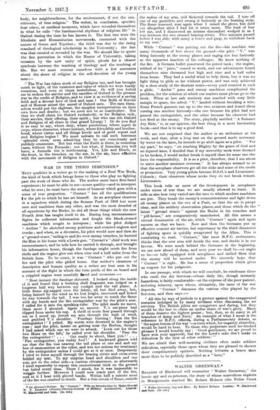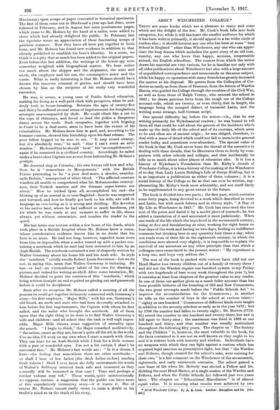WALTER GREENWAY.•
READERS of Blackwood will remember " Walter Greenway," the heroic spy and ex-prisoner, the story of whose marvellous exploits in Mesopotamia reached Mr. Robert Holmes (the Police Court • Walter Greenland, Spy and Hero. By Hobert Helots. 1.55,555: W. Blackwood and Som. ins. nett
Missionary) upon scraps of paper concealed in botanical specimens. The first of them came out in Blackwood a year ago last June, more followed in February, and in August last some posthumous pages, which came to Mr. Holmes by the hand of a sailor, were added to those which had already delighted the public. In February last the Spectator wrote an appreciation of those fascinating scraps of patriotic romance. Now they have all been put together in book form, and Mr. Holmes has found new evidence in addition to that already published to establish his hero's identity. In a sense, we think it is a pity that so much has been added to the original papers. Even before this last addition, the writings of the heroic spy were somewhat weighted with biographical matter. We hoar rather too much about the skipper and the shipmates, the aunt and uncle, the employer and his eon, the consumptive sister and the nurse. What is really interesting is that Mr. Holmes should have known this innocent criminal of genius, and should have been chosen by him as the recipient of his really very wonderful narrative.
He was, it seems, a young man of Public School education, making his living as a well-paid clerk with prospects, when he sud- denly took to house-breaking. Between the ages of twenty-five and thirty he suffered several terms of imprisonment for burglarious attempts unaccompanied by theft. He could climb like a cat to the tops of chimneys, and loved to lead the police a dangerous dance across the roofs. Such escapades, together with feigning in Court to be a deaf-mute, seem to have been the extent of his criminalities. Mr. Holmes know him in gaol, and, according to his humane custom, showed him friendship upon his final release. The poor follow begged to be sent to sea. " It may sound strange, but it's absolutely true," he said, "that I can't resist an attic window." He feared lest he should be at " his " accomplishments" again if ho remained in a civilized country. Accordingly he sailed under a benevolent Captain not averse from befriending Mr. Holmes's protigia.
Ho deserted ship at Colombo ; his own letters tell how and why. Soon he is " somewhere in Mesopotamia" with the British Forces pretending to be " a poor deaf-mute, a slender, swarthy, agile Beduin," unsuspected of white blood. "The afflicted creature wanders all unable to comprehend what his Mohammedan country- men, their Turkish masters and the German super-bosses, are about." How he tricked them all, accomplished his end—the blowing up of an arsenal in or near Baghdad—how he was suspected end tortured, and how he finally got back to his wife, are told in language as convincing as it is strong and thrilling. His devotion to his native land, where he had suffered so much harshness, yet for which he was ready at any moment to suffer or die, allows always, yet without ostentation, and touches the reader to the quick.
His last letter was written within a few hours of his death, which took place in a British hospital where Mr. Holmes knew a nurse, whose corroborative evidence leaves him in no doubt that his hero is no more. He had not long, however, regarded more news from him as impossible when a sailer turned up with a packet con- taining a notebook which he said had been entrusted to him by an Arab Sheikh. The notebook contained a sort of rhapsody written by Walter Greenway about his home life and his Arab wife. In style the " notebook " vividly recalls Robert Louis Stevenson—but we do not, in saying this, mean that Walter Greenway is imitating. He has—or had—an extraordinary talent of his own for drawing a picture, and indeed for writing en idyll. After some hesitation, Mr, Holmes decided to print the contents of this " notebook," which being written straight on end required no piecing out and guesswork before it could be deciphered.
Soon after its reception Mr. Holmes called a meeting of all the persona he could got together intimately connected with Greenway's story—his first employer, "Major Mills," with his eon, Greenway's old friend, an uncle and aunt who had been devotedly attached to him before his first imprisonment, the Captain with whom he first sailed, and the sailor who brought the notebook. All of them agree that the right thing to be done is to find Walter Greenway's wife and children—and all admit that the task is well-nigh impel,. siblo. Major Mills throws some suggestion of unreality upon the search. "I begin to think," the Major remarked meditatively, " the sailors, smart as they are, haven't quite all the wit in the world. I've an idea Ill work on my own when I start a search with them. They can hunt for an Arab Sheikh while I look for a little woman with a pair of wonderful eyes. I'm not a bit certain I shan't ho successful first." Mr. Holmes 's last words aro " Is it a dream I have—the feeling that somewhere there are other notebooks— or shall I hear of her father [the Arsh father-in-law] sending fresh tokens 1 Shall I over know she fully understands the words of Walter's Soliloquy received back safe and treasured as they assuredly will be treasured in that case ? Time and perhaps a further volume may tell." 'These words, quite unintentionally wo suppose, contain a suggestion that the public can have more of this superlatively interesting story—if it wants it. But of course Mr. Holmes cannot really mean to raise a doubt in his reades'a mind as to the truth of his story.















































 Previous page
Previous page